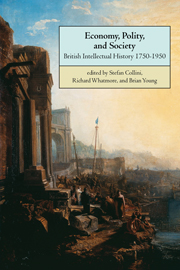Book contents
- Frontmatter
- Contents
- Preface
- General introduction
- Presentation of Economy, Polity, and Society
- Part I
- Part II
- 5 Economy and polity in Bentham's science of legislation
- 6 ‘A gigantic manliness’: Paine's republicanism in the 1790s
- 7 Irish culture and Scottish enlightenment: Maria Edgeworth's histories of the future
- 8 Improving Ireland: Richard Whately, theology, and political economy
- Part III
- List of contributors
- Acknowledgements
- Index
8 - Improving Ireland: Richard Whately, theology, and political economy
Published online by Cambridge University Press: 18 December 2009
- Frontmatter
- Contents
- Preface
- General introduction
- Presentation of Economy, Polity, and Society
- Part I
- Part II
- 5 Economy and polity in Bentham's science of legislation
- 6 ‘A gigantic manliness’: Paine's republicanism in the 1790s
- 7 Irish culture and Scottish enlightenment: Maria Edgeworth's histories of the future
- 8 Improving Ireland: Richard Whately, theology, and political economy
- Part III
- List of contributors
- Acknowledgements
- Index
Summary
Despite the work of Boyd Hilton and others, it is possible, even now, to neglect the role of religion in Victorian reform movements. It is also possible to defer too much to Irish exceptionalism, the deeply ingrained sense that, whatever might be said or done about public policy in England, it was always going to be irrelevant and wrong for Ireland. As other essays in this and its companion volume, History, Religion, and Culture, demonstrate, Scotland and France play an important role in British intellectual history, but nineteenth-century Ireland should not be forgotten as testing-ground, catalyst, and sometimes source of British political and social thought. Ireland demonstrated some of the worst problems of a pre-industrial economy in the earlier nineteenth century, but parts of Great Britain were still essentially pre-industrial at the same period. Consideration of the career of Richard Whately (1787–1863) makes possible a more nuanced understanding not only of the continuing interdependence of religion and public policy but of the interaction of Great Britain and Ireland under conditions of distress, disorder and possible improvement.
Whately, Englishman, Fellow of Oriel and Archbishop of Dublin, came from a family of improvers. His uncle, Thomas Whately, MP, wrote a celebrated treatise on landscape gardening, Observations on Modern Gardening (1770; 5th edition 1793). The younger Whately improved gardens, in which he grew exotic and experimentally grafted plants, improved his Suffolk parish, renovating the school and adding 250 seats to the church, and improved Oxford's ailing St Alban Hall, which he served as Principal (1825–31).
- Type
- Chapter
- Information
- Economy, Polity, and SocietyBritish Intellectual History 1750–1950, pp. 181 - 202Publisher: Cambridge University PressPrint publication year: 2000
- 3
- Cited by



